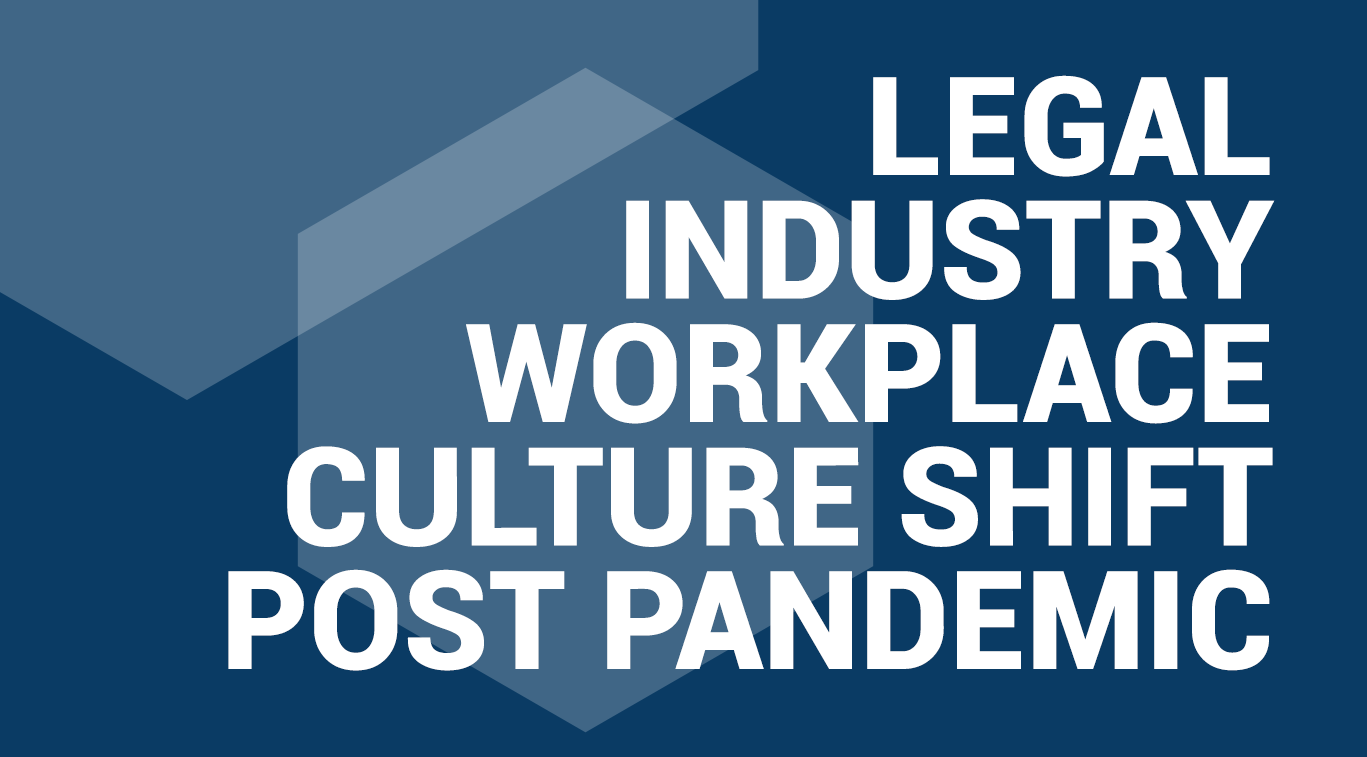Legal Industry Workplace Culture Shift Post Pandemic

Written by Fatima Freifer
Blogger

Traditionally, law firms were able to attract and retain talent by offering generous monetary incentives, the possibility of future partnership, and the positive reputation that comes with being a corporate attorney in a reputable firm. Law students relished the thought of a stable and guaranteed source of high earning potential, in their view an excellent trade-off for their years of law training.
However, the landscape has shifted, and it is now recognised that a workplace culture can make or break a business. As many law firms enter a new era of hybrid working, law firm workplace culture is truly at a crossroads. Working from home helped to shine a light on many companies’ cultures; the hustle and bustle of day-to-day life was removed.
The Covid-19 pandemic has had a huge and rapid impact on workplace culture, with an overriding change in workplace mentality in regards to remote working. In the short space of two years, it has come to the forefront and created a lasting impact in terms of culture. This includes a shift in client meetings, signing contracts [1] and operations. Organisational leaders must consider which culture changes they want to retain and which they must counteract as they adjust to operating during a pandemic and prepare for recovery.
The global lockdown has challenged long-held beliefs about the nature of work and business interactions. People in the legal industry have discovered that they do not need to be in an office and that they can complete most tasks remotely [2]. Remote working legal support has allowed others to have made the transition from outbound travel to home-bound with little impact on their firms.
Recognition of workplace culture
Technology in the legal sector has been incorporated with a relative success rate, with cutting edge software firms helping to ease the burden of more traditionally cumbersome tasks, such as manual data entry and filing. However, in such a traditional field, workplace culture has not always been part of the vision for many firms, as other factors took greater precedence, namely generating profitability in a highly competitive field. Whilst UK legal tech has made great leaps in terms of innovation, it could be argued that the pandemic has forced the industry to promote employee wellbeing and interactions on a larger scale. Consider the rapid adoption of digital tools, which can create the false impression that a physical presence in the office is unnecessary. Most professional jobs can, without a doubt, be done remotely.
According to a report from Culture Shift [3], the pandemic has had an unexpectedly positive impact on workplace culture across the UK, with 73 percent describing remote working as positive in the current climate and 38 percent saying it has actively improved since they switched to remote working, which aligns with legal support remote working tools in place. Working from home has increased productivity for more than one-third of respondents, while working from home has improved their mental health for more than 28 percent, and 45 percent are dreading returning to work, which suggested signs of lawyer burnout [4].
Arguably, the value of workplace culture, and interaction in leadership has only recently become a priority, if not a consideration. And it is not unreasonable to believe that many law firms’ workplace cultures have simply emerged rather than being recognised, especially in light of the pandemic, this could be a real test of a company’s culture. Other critical times when a law firm’s culture can be tested are after a merger and when a new office is opened. Finding synergies and ensuring each office reflects the firm’s core values while having its own distinct culture will be a challenge for a law firm with multiple offices. Top legal software cannot replace a good working culture; rather the two complement each other and provide an optimal working space [5] for staff.
Legal industry improvement guidelines
According to Workplace Culture Thematic Review [6], although a majority of law respondents felt positively about their work environments, the report found that there was still room for improvement in areas such as systematic bullying, discrimination and mental health.
Other areas of concern included an overemphasis on targets and ‘wholly unreasonable’ workloads, as well as senior staff abuses of authority that went unchecked by the firm and firms pressuring staff to withdraw any lodged complaints. The review also emphasised the role that prioritising employee well-being can play in benefiting a company’s bottom line by lowering staff turnover and recruitment costs, appearing more appealing to prospective talent and improving client experiences.
Leaders can also convey the significance of discipline and boundaries. [7] People who work entirely alone tend to be less productive over time, even if they work longer hours than they did in the office. They lose their frame of reference as well as their task orientation. The distinction between working and not-working is blurring. [8] Home workers do not receive signals about when to turn off, as office workers do when they leave their office building at the end of the day. Leaders can thus communicate that there is a time for work and a time for play, and they can model this behaviour in their own actions. [9]
Conclusion
Defining purpose, values and principles may be the answer to all of the legal sector’s calls for adaptability. The path to partnership, which is still rocky and requires many sacrifices, could be facilitated in this manner. To metaphorically arm itself with tools for law, law firms must make compelling offers, cultivate connections and, most importantly, develop their culture. [10]
Developing a culture in which wellbeing and other similar factors can be discussed is critical for staff retention, morale and the firm’s long-term success and productivity.
References
[1] Virtual Legal Consultations & Ethical Considerations, Fatima Freifer, https://goodlawsoftware.co.uk/virtual-legal-consultations-ethical-considerations
[2] The UK Legal System and its Adaptability in the Face of Technological Change, Fatima Freifer, https://goodlawsoftware.co.uk/the-uk-legal-system-and-its-adaptability-in-the-face-of-technological-change
[3] UK workforce say remote working has positively impacted culture, Chelsea Maher, Updated on February 9, 2022, https://insight.culture-shift.co.uk/employee-wellbeing/uk-workforce-say-remote-working-has-positively-impacted-culture
[4] The Unpleasant Truth About Law Firm Culture, Jordan Furlong, Dec 2021, https://www.law.com/americanlawyer/2021/12/17/the-unpleasant-truth-about-law-firm-culture/
[5] Managing Work Stress in the Holidays, Fatima Freifer, https://goodlawsoftware.co.uk/managing-work-stress-in-the-holidays
[6] Law firms must give lawyers and staff ‘psychologically safe’ ways to address workplace culture concerns, says SRA, Madeline Anderson, 09 Feb 2022, https://www.globallegalpost.com/news/law-firms-must-give-lawyers-and-staff-psychologically-safe-ways-to-address-workplace-culture-concerns-says-sra-2046807452
[7] Reshaping the Legal Profession: The Need for Culture, So-Ang Park, Sep 2020, https://www.egonzehnder.com/functions/legal-regulatory-compliance-professionals/insights/reshaping-the-legal-profession-the-need-for-culture
[8] Why it is crunch time for law firm culture, Craig McMurrough, 6 December 2021, https://www.lawgazette.co.uk/practice-management/why-it-is-crunch-time-for-law-firm-culture/5110803.article
[9] How the pandemic can change workplace culture for the better, James Thomas, https://www.strategyand.pwc.com/m1/en/articles/2020/how-the-pandemic-can-change-workplace-culture-for-the-better.html
[10] Promoting a good workplace culture in the Legal Profession, John Hosie, November 25, 2020 https://www.wtwco.com/en-GB/Insights/2020/11/promoting-a-good-workplace-culture-in-the-legal-profession








